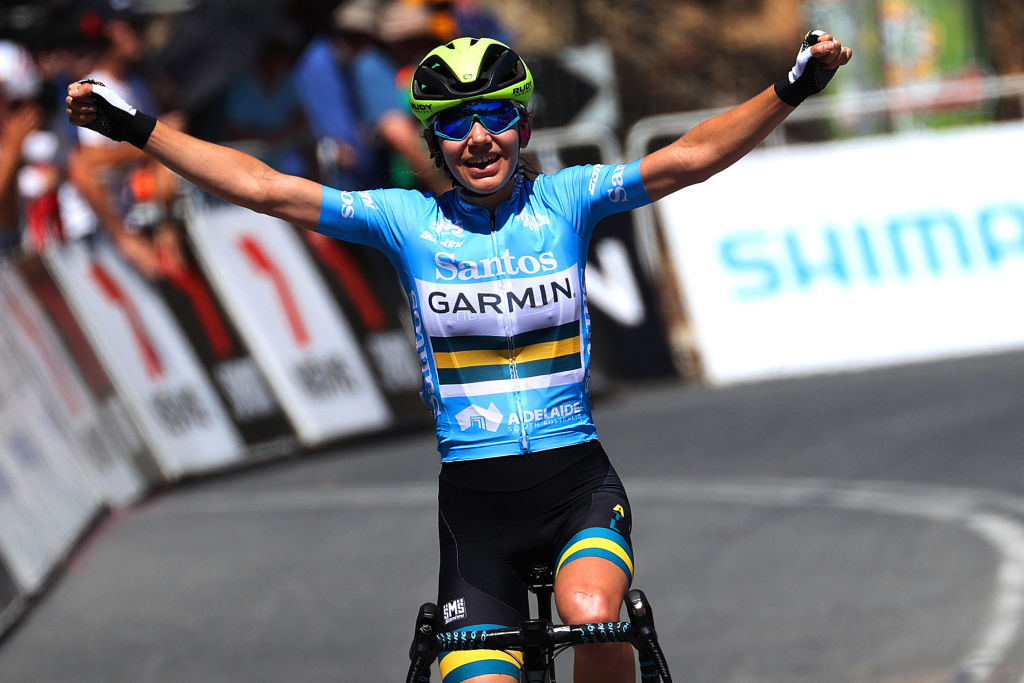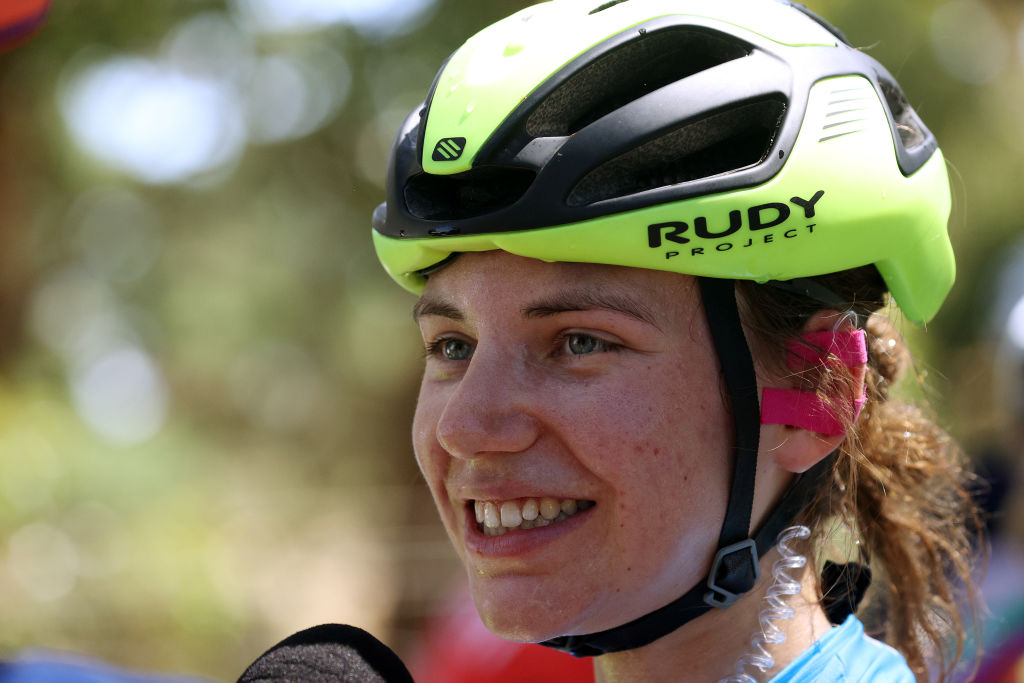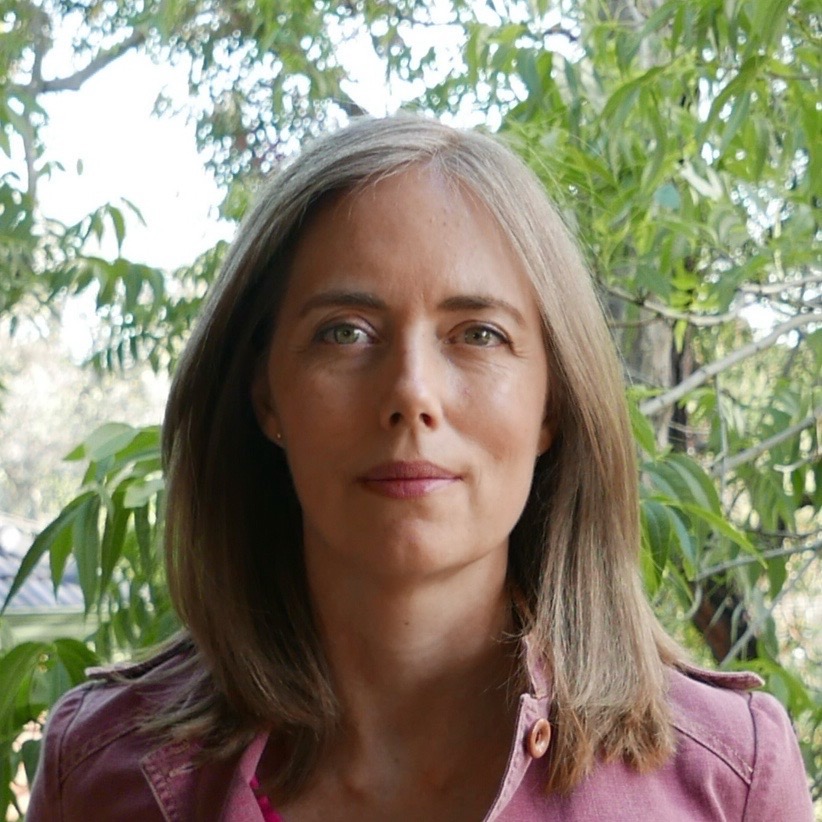Sarah Gigante: From howls of pain and disappointment to an Olympics dream
Australian ready to take on the road race and time trial at Tokyo after recovering from three broken bones in April

Just three months ago Sarah Gigante was sitting in the team car having abandoned La Flèche Wallonne after a horrible crash and her howls of pain when the bumps on the road aggravated her three breaks were punctuated by sobs of disappointment. This race was a last chance to lay a claim for selection in the Australian team for the Tokyo Olympic Games and Gigante now thought that dream had been smashed to pieces, just like her collarbone, elbow and fibula.
It wasn’t too long, however, before the sobs turned to shouts of joy.
“It was a really big shock when I got the call, I was still on the ergo actually,” said Gigante earlier this month before she headed off to Tokyo. “I wasn't allowed outside yet and I got the call to say I've been picked for the Olympics. It's just such an amazing feeling and to know that they had faith in me.
“It really helped me in my recovery. It felt like a slow recovery and it was really hard mentally but that they believed that I could do it, that really helped me believe that I could do it."
It’s not the first time the 20-year-old Gigante has had to work her way back from injury ahead of a big event. The Victorian rider broke her left elbow, left shoulder and right wrist in May of 2018 and then in August lined up for Junior Track Worlds, where she secured silver in the women’s Points Race, and then road Junior Road Worlds in September.
Plus, the rider came out firing in 2021 despite Melbourne’s 15-week COVID-19 lockdown last year, which included strict limits on outdoor exercise that were set at a maximum of an hour a day throughout much of the time. She fronted up to Santos Festival of Cycling and Australian National Championships able to challenge many riders who had spent much of the last part of 2020 racing in Europe or training largely unhindered in other parts of the nation. And she didn’t just challenge them, but beat them emphatically, taking the overall and two stage wins at South Australia’s Tour Down Under replacement race and winning a second national elite time trial title.
“I came out really strong for that tour, it was the best racing I've ever had, and that was coming out of so many months on the ergo so I think they were quite confident in my ability to train hard," said Gigante.
Get The Leadout Newsletter
The latest race content, interviews, features, reviews and expert buying guides, direct to your inbox!
Before she could train hard, though, she had to recover – not an easy task at the best of times but even harder when faraway from the well-established support systems of home. This was Gigante’s first year based in Europe, with the distance exacerbated by strict COVID-19 induced border rules in Australia which make it hard to get in and out of the country. The difficulties of managing an injury while far from home started with the trip to hospital.
“The first hospital I went to I had to go in solo because of COVID, so I hobbled in and they didn't speak any English and … I was just kind of pointing, saying I think this might be broken and they’d X-ray it,” said Gigante, who after her collarbone pointed to her elbow, which also turned out to be broken and then it was her leg, too. With a chuckle she said she then decided it might be a good idea to stop pointing at things, as it wasn’t turning out well for her.
“They couldn't really explain much to me because ... I learnt French and I think I'm all right at it but we didn't learn stuff like fibula and radial head so it was a bit challenging."
Gigante, though, said she was fortunate to have the support of Rory Sutherland, elite road coordinator for the Australian Cycling Team in Europe, who helped her organise further medical treatment and then he and his family also supported her through the recovery process in Spain.
"At first I thought my leg wouldn't be that bad but then it turned out that I had to have like two weeks pretty much on the couch,” said Gigante, who added that then even when she was allowed on the ergo she could only take it easy as she couldn’t risk moving the bone.
“It was a really, really nasty shock finding that out. I already thought it was bad but that I could get through it because it would be short, but then finding out that it was actually way worse and your collarbone in five pieces with surgery is actually the easy part. That was pretty a big shock."
A well-rounded team

Unable to ride outside for a month and then having to take it carefully, the decision was made that if Gigante was to be her best at the Olympics racing the Giro d’Italia Donne with her team, Tibco-Silicon Valley Bank, would be too much too soon. With the benefit of hindsight, that may have been a good thing. The squad pulled out of the race ahead of stage 7 after a COVID-19 positive was discovered in the team, emphasising that this is an environment where even just making it to the start line has extra challenges.
Once the team have made it to the start line, there are of course plenty more. The most obvious is just how you beat a Dutch team that is lining up with four of the world’s top five riders on its squad, Anna van der Breggen, Annemiek van Vleuten, Demi Vollering and Marianne Vos. They provide a formidable group of opponents for Sunday’s 137-kilometre course for the road race which has 2,692 vertical metres of climbing but there is certainly no attitude evident within the Australian team of Amanda Spratt, Grace Brown, Tiffany Cromwell and Gigante that they are purely racing for the lower steps of the podium.
“We have a really well rounded team, we're all completely different riders so I think no matter what the scenario is then hopefully, Tiff, Spratty Grace and I hopefully we can cover it,” said Gigante. “I think that makes us a really good team, just because we're all so different.”
After the road race, Gigante will then turn her attention to the time trial on July 28, alongside Brown, with the 22.1-kilometre loop on the Fuji speedway containing 423 metres of elevation gain.
“I love the time trial course … this one is pretty much as good as it could get for a time trial,” said Gigante, who is unquestionably fond of the climbs.
Australia’s national champion in the discipline, both this year and last, hasn’t really had the opportunity to show what she can do in a big international event so it will be interesting to see where she slots in. Wherever it is, the rider who has always conducted herself with a level-headed approach and maturity well beyond her years, has one key goal.
"Just giving it my best shot because there's nothing else I can do,” said Gigante. “I've done everything that I could do in training, everything I'm meant to do off the bike and on the bike so I'm not going to be happy with one result or sad with another as long as I can just say I did everything I could on the day and also in the months leading up to it.
“I know I've done everything so far that I could have so I'm already proud of how I've gone."

Simone is a degree-qualified journalist that has accumulated decades of wide-ranging experience while working across a variety of leading media organisations. She joined Cyclingnews as a Production Editor at the start of the 2021 season and has now moved into the role of Australia Editor. Previously she worked as a freelance writer, Australian Editor at Ella CyclingTips and as a correspondent for Reuters and Bloomberg. Cycling was initially purely a leisure pursuit for Simone, who started out as a business journalist, but in 2015 her career focus also shifted to the sport.